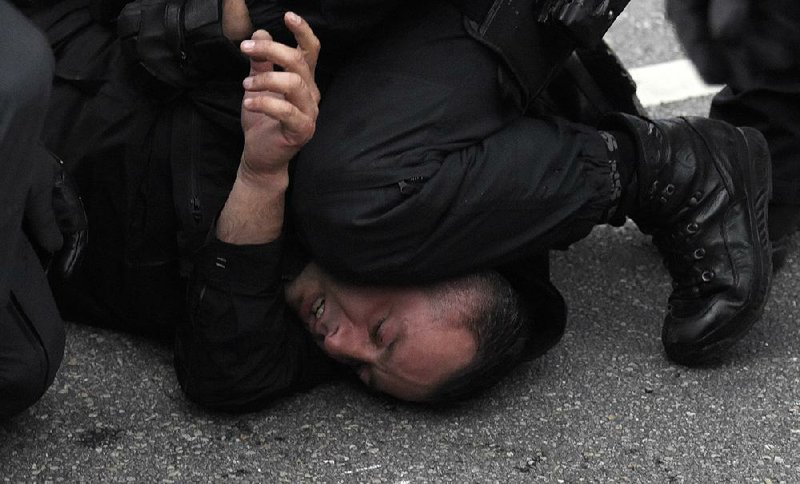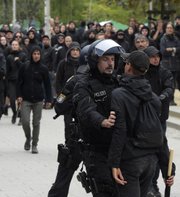CHEMNITZ, Germany -- Police in eastern Germany halted an anti-migration protest march that far-right activists started on Saturday in hopes of launching a nationwide movement capable of challenging the political establishment.
Several groups scheduled rallies in the city of Chemnitz over the Aug. 26 killing there of a German citizen, allegedly by migrants from Syria and Iraq.
The largest groups have invited concerned citizens to join them later as they converge for the first time, hoping a broader far-right drive emerges from their display of unity.
If the number of people who attended is any gauge, the envisioned far-right movement was in the earliest of embryonic stages. It drew about 4,500 participants, Saxony state police reported before citing security concerns as the reason for ending the event early.
The demonstrators screamed and whistled angrily as officers broke up the protest.
The march was stopped several times along the way as counterprotesters blocked the route and the police officers deployed to keep them and the marchers apart flooded into the street. The counterprotesters numbered about 4,000, the state police said.
The opposing camps confronted one another in Chemnitz on Monday, and scenes of vigilantes chasing foreigners in the city's streets have shocked people in other parts of Germany since then.
Police, at times, were unable to control the earlier protests and clashes.
Leaders of the two groups that combined forces on Saturday night cultivated a different image for the "mourning march," wearing dark suits and carrying white roses.
However, the mood at the event bringing together previously isolated clusters of nationalists -- from lawmakers to Hitler-saluting skinheads -- darkened as the sun set. People from both ends of the political spectrum could be seen drinking beer and shouting slurs at police.
The tension in the air reflected the polarization over Germany's ongoing effort to come to terms with an influx of more than 1 million refugees and migrants seeking jobs since 2015.
The right blames Chancellor Angela Merkel's decision to allow in hundreds of thousands of asylum seekers from war-torn countries like Syria, Iraq and Afghanistan for multiple problems. Some far-right supporters argue that migrants are responsible for an increase in serious crimes, especially attacks on women.
The anti-migrant sentiment has been particularly strong in Saxony, the state where Chemnitz is located and traditional strongholds of two groups that were seeking to launch a nationwide movement Saturday night.
The Patriotic Europeans Against the Islamization of the West has held weekly rallies in Saxony's capital of Dresden for several years. The far-right Alternative for Germany party received almost a quarter of the Saxony vote in Germany's national election.
The Patriotic Europeans Against the Islamization of the West's strength had fizzled in recent years while groups like the Alternative for Germany party successfully used anti-Muslim sentiment to propel themselves into federal and state parliaments across Germany.
The stabbing death of the 35-year-old man in Chemnitz a week ago provides the provincial group an opportunity to reactivate its base.
German Justice Minister Katarina Barley said Saturday that authorities should investigate the role of networks from the radical far right in spearheading the week's protests.
"We do not tolerate that right-wing extremists infiltrate our society," Barley told weekly newspaper Bild am Sonntag. "It's about finding out who's behind the mobilization of far-right criminals."
Police appeared to have been caught unprepared when the slaying triggered protests that attracted crowds openly engaging in Nazi veneration and which devolved into violence.
Two asylum seekers, a 22-year-old Iraqi and a 23-year-old Syrian, have been arrested on suspicion of manslaughter.
German Interior Minister Horst Seehofer, known for his anti-migrant stance, said Saturday that he understood why "the people in Chemnitz and elsewhere are upset about the brutal killing" but added "there's no excuse for violence," Funke Media Group reported.
"We need a strong state and we have to do everything politically to overcome the polarization and division of our society," Seehofer stressed.
Information for this article was contributed by Frank Jordans of The Associated Press.
A Section on 09/02/2018


